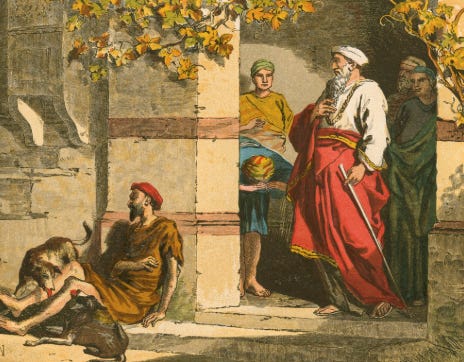The Dishonest Manager, the Rich Man, and Us
Through a lifetime of self-centeredness, he chose hell for himself. His only crime was omission—he failed to show charity toward his fellow human in need, and for this he was damned.
Written for Catholic Unscripted by Clement Harrold
Last week’s Gospel contained perhaps the most bewildering of all Jesus’s parables. I’ve written elsewhere about how to make sense of this story: Jesus is affirming the manager’s shrewdness and proactivity, not his dishonesty. When the manager realises his “judgment day” is approaching, he sets about fixing his situation with an acute sense of urgency. How much more so should we prepare for our own judgment day, when the Master will call us to account based on how faithfully we have served in His household.
That’s all well and good. But the Mass readings for last Sunday (the 25th in Ordinary Time) also help us to meditate more deeply on an aspect of this parable which I had previously only noticed in passing. Given her choice of readings, it seems that Mother Church wants us to focus our attention on the moral lesson which Jesus provides at the parable’s conclusion: “And I tell you, make friends for yourselves by means of unrighteous wealth, so that when it fails they may receive you into the eternal dwellings” (Luke 16:9).
In this verse, the worldly prudence of the dishonest manager becomes a model for Christian almsgiving. Given the fleeting nature of human health, Jesus uses the example of the manager to exhort us to direct our money towards an eternal investment. We do this through supporting the poor and the oppressed, as last Sunday’s readings consistently affirm.
In our first reading, the prophet Amos solemnly warned his listeners that God would not forget their continued neglect of those in need. In our responsorial psalm, we sang the refrain: “Praise the Lord, who raises the poor.” We heard the same theme in our Gospel acclamation, recalling St. Paul’s majestic words in 2 Corinthians 8:9: “Jesus Christ, though he was rich, yet for your sake he became poor, so that you by his poverty might become rich.”
The only reading last Sunday which wasn’t explicitly focused on almsgiving was our second reading from St. Paul’s first letter to Timothy. Instead, this centered on the complementary lesson that we cannot hope to be saved apart from God’s grace.
These different Scriptures help us to enter into the profound beauty of the Parable of the Dishonest Manager. We are all sinful stewards guilty of wasting God’s possessions. Our money, our talents, our time: none of these really belong to us. All of them belong to Him, and He will judge us on how well we have managed them during our time on earth. Moreover, while we can expect our divine Master to be patient with us for a time, we can be sure that His patience will not last forever.
How to climb out of this mess? We do it by using the Master’s possessions—that is, the money, talents, and time He has assigned to us—to help those in need. In particular, we are to make friends with those who are most dependent on our Master, namely, the poor and the oppressed (the unborn would be a prime example of this latter category). While there is nothing we can offer them which does not belong to our Master, our Master is a very wealthy man. In a remarkable act of munificence, He has given us stewardship over a significant portion of His possessions. But now expects us to use those possessions to be as unparsimonious towards those around us as He has been to us.




